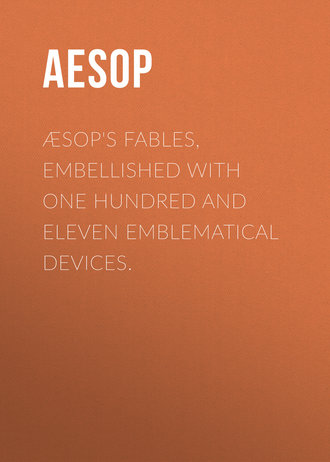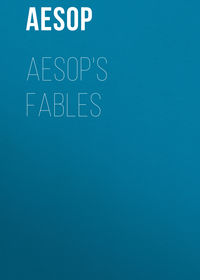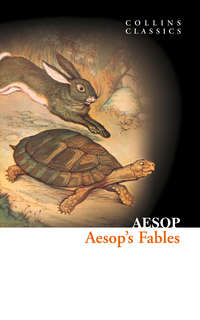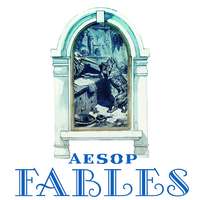 полная версия
полная версияÆsop's Fables, Embellished with One Hundred and Eleven Emblematical Devices.
What can this fable be applied to but the exceeding blindness and stupidity of that part of mankind who wantonly and foolishly trust their native rights of liberty without good security? Who often choose for guardians of their lives and fortunes, persons abandoned to the most unsociable vices; and seldom have any better excuse for such an error in politics than, that they were deceived in their expectation; or never thoroughly knew the manners of their king till he had got them entirely in his power: which, however, is notoriously false; for many, with the Doves in the fable, are so silly, that they would admit of a Kite, rather than be without a king. The truth is, we ought not to incur the possibility of being deceived in so important a matter as this: an unlimited power should not be trusted in the hands of any one who is not endued with a perfection more than human.
FABLE XVII
THE COUNTRY MOUSE AND THE CITY MOUSEAn honest, plain, sensible Country Mouse, is said to have entertained at his hole one day a fine Mouse of the Town. Having formerly been playfellows together, they were old acquaintance, which served as an apology for the visit. However, as master of the house, he thought himself obliged to do the honours of it, in all respects, and to make as great a stranger of his guest as he possibly could. In order to this, he set before him a reserve of delicate grey peas and bacon, a dish of fine oatmeal, some parings of new cheese, and, to crown all with a dessert, a remnant of a charming mellow apple. In good manners, he forbore to eat any himself, lest the stranger should not have enough; but, that he might seem to bear the other company, sat and nibbled a piece of a wheaten straw very busily. At last says the spark of the town, 'Old crony, give me leave to be a little free with you; how can you bear to live in this nasty, dirty, melancholy hole here, with nothing but woods and meadows, and mountains, and rivulets, about you? Do not you prefer the conversation of the world to the chirping of birds, and the splendour of a court to the rude aspect of an uncultivated desert! Come, take my word for it, you will find it a change for the better. Never stand considering, but away this moment. Remember, we are not immortal, and therefore have no time to lose. Make sure of to-day, and spend it as agreeably as you can; you know not what may happen to-morrow.' In short, these and such like arguments prevailed, and his Country Acquaintance was resolved to go to town that night. So they both set out upon their journey together, proposing to sneak in after the close of the evening. They did so; and, about midnight, made their entry into a certain great house, where there had been an extraordinary entertainment the day before, and several tit-bits, which some of the servants had purloined, were hid under the seat of a window. The Country Guest was immediately placed in the midst of a rich Persian carpet: and now it was the Courtier's turn to entertain; who, indeed, acquitted himself in that capacity with the utmost readiness and address, changing the courses as elegantly, and tasting every thing first as judiciously, as any clerk of a kitchen, the other sat and enjoyed himself like a delighted epicure, tickled to the last degree with this new turn of his affairs; when, on a sudden, a noise of somebody opening the door made them start from their seats, and scuttle in confusion about the dining-room. Our Country Friend, in particular, was ready to die with fear at the barking of a huge mastiff or two, which opened their throats just about the same time, and made the whole house echo. At last, recovering himself – 'Well,' says he, 'if this be your town life, much good may do you with it: give me my poor quiet hole again, with my homely, but comfortable, grey peas.'
APPLICATIONA moderate fortune, with a quiet retirement in the country, is preferable to the greatest affluence which is attended with care and the perplexity of business, and inseparable from the noise and hurry of the town. The practice of the generality of people of the best taste, it is to be owned, is directly against us in this point; but, when it is considered that this practise of theirs proceeds rather from a compliance with the fashion of the times, than their own private thoughts, the objection is of no force. Among the great numbers of men who have received a learned education, how few are there but either have their fortunes entirely to make, or, at least, think they deserve to have, and ought not to lose the opportunity of getting, somewhat more than their fathers have left them! The town is the field of action for volunteers of this kind; and whatever fondness they may have for the country, yet they must stay till their circumstances will admit of a retreat thither. But sure there never was a man yet, who lived in a constant return of trouble and fatigue in town, as all men of business do in some degree or other, but has formed to himself some end of getting some sufficient competency, which may enable him to purchase a quiet possession in the country, where he may indulge his genius, and give up his old age to that easy smooth life which, in the tempest of business, he had so often longed for. Can any thing argue more strongly for a country life, than to observe what a long course of labour people go through, and what difficulties they encounter to come at it? They look upon it, at a distance, like a kind of heaven, a place of rest and happiness; and are pushing forward through the rugged thorny cares of the world, to make their way towards it. If there are many who, though born to plentiful fortunes, yet live most part of their time in the noise, the smoke, and hurry of the town, we shall find, upon inquiry, that necessary indispensible business is the real or pretended plea which most of them have to make for it. The court and the senate require the attendance of some: lawsuits, and the proper direction of trade, engage others: they who have a sprightly wit and an elegant taste for conversation, will resort to the place which is frequented by people of the same turn, whatever aversion they may otherwise have for it; and others, who have no such pretence, have yet this to say, that they follow the fashion. They who appear to have been men of the best sense amongst the ancients, always recommended the country as the most proper scene for innocence, ease, and virtuous pleasure; and, accordingly, lost no opportunities of enjoying it: and men of the greatest distinction among the moderns, have ever thought themselves most happy when they could be decently spared from the employments which the excellency of their talents necessarily threw them into, to embrace the charming leisure of a country life.
FABLE XVIII
THE SWALLOW AND OTHER BIRDSA farmer was sowing his field with flax. The Swallow observed it, and desired the other Birds to assist her in picking the seed up, and in destroying it; telling them, that flax was that pernicious material of which the thread was composed which made the fowler's nets, and by that means contributed to the ruin of so many innocent birds. But the poor Swallow not having the good fortune to be regarded, the flax sprung up, and appeared above the ground. She then put them in mind once more of their impending danger, and wished them to pluck it up in the bud, before it went any further. They still neglected her warnings; and the flax grew up into the high stalk. She yet again desired them to attack it, for that it was not yet too late. But all that she could get was to be ridiculed and despised for a silly pretending prophet. The Swallow finding all her remonstrances availed nothing, was resolved to leave the society of such unthinking, careless creatures, before it was too late. So quitting the woods, she repaired to the houses, and forsaking the conversation of the Birds, has ever since made her abode among the dwellings of men.
APPLICATIONAs men, we should always exercise so much humanity as to endeavour the welfare of mankind, particularly of our acquaintance and relations: and, if by nothing further, at least by our good advice. When we have done this, and, if occasion required, continued to repeat it a second or third time, we shall have acquitted ourselves sufficiently from any imputation upon their miscarriage; and having nothing more to do but to separate ourselves from them, that we may not be involved in their ruin, or be supposed to partake of their error. This is an excommunication which reason allows. For as it would be cruel, on the one side, to prosecute and hurt people for being mistaken, so, on the other, it would be indiscreet and over complaisant, to keep them company through all their wrong notions, and act contrary to our opinion out of pure civility.
FABLE XIX
THE HUNTED BEAVERIt is said that a Beaver (a creature which lives chiefly in the water) has a certain part about him which is good in physic, and that, upon this account, he is often hunted down and killed. Once upon a time, as one of these creatures was hard pursued by the dogs, and knew not how to escape, recollecting with himself the reason of his being thus persecuted, with a great resolution and presence of mind, he bit off the part which his hunters wanted, and throwing it towards them, by these means escaped with his life.
APPLICATIONHowever it is among beasts, there are few human creatures but what are hunted for something else besides either their lives or the pleasure of hunting them. The inquisition would hardly be so keen against the Jews, if they had not something belonging to them which their persecutors esteem more valuable than their souls; which whenever that wise, but obstinate people, can prevail with themselves to part with, there is an end of the chase for that time. Indeed, when life is pursued, and in danger, whoever values it, should give up every thing but his honour to preserve it. And when a discarded minister is prosecuted for having damaged the commonwealth, let him but throw down some of the fruits of his iniquity to the hunters, and one may engage for his coming off, in other respects, with a whole skin.
FABLE XX
THE CAT AND THE FOXAs the Cat and the Fox were talking politics together, on a time, in the middle of a forest, Reynard said, 'Let things turn out ever so bad, he did not care, for he had a thousand tricks for them yet, before they should hurt him.' – 'But pray,' says he, 'Mrs. Puss, suppose there should be an invasion, what course do you design to take?' – 'Nay,' says the Cat, 'I have but one shift for it, and if that won't do, I am undone.' – 'I am sorry for you, replies Reynard, 'with all my heart, and would gladly furnish you with one or two of mine, but indeed, neighbour, as times go, it is not good to trust; we must even be every one for himself, as the saying is, and so your humble servant.' These words were scarce out of his mouth, when they were alarmed with a pack of hounds, that came upon them full cry. The Cat, by the help of her single shift, ran up a tree, and sat securely among the top branches; from whence she beheld Reynard, who had not been able to get out of sight, overtaken with his thousand tricks, and torn in as many pieces by the dogs which had surrounded him.
APPLICATIONA man that sets up for more cunning than the rest of his neighbours, is generally a silly fellow at the bottom. Whoever is master of a little judgment and insight into things, let him keep them to himself, and make use of them as he sees occasion; but he should not be teasing others with an idle and impertinent ostentation of them. One good discreet expedient, made use of upon an emergency, will do a man more real service, and make others think better of him, than to have passed all along for a shrewd crafty knave, and be bubbled at last. When any one has been such a coxcomb as to insult his acquaintance, by pretending to more policy and stratagem than the rest of mankind, they are apt to wish for some difficulty for him to show his skill in; where, if he should miscarry (as ten to one but he does) his misfortune, instead of pity, is sure to be attended with laughter. He that sets up for a biter, as the phrase is, being generally intent upon his prey, or vain of showing his art, frequently exposes himself to the traps of one sharper than himself, and incurs the ridicule of those whom he designed to make ridiculous.
FABLE XXI
THE CAT AND THE MICEA certain house was much infested with Mice; but at last they got a Cat, who catched and eat every day some of them. The Mice, finding their numbers grow thin, consulted what was best to be done for the preservation of the public from the jaws of the devouring Cat. They debated and came to this resolution, That no one should go down below the upper shelf. The Cat, observing the mice no longer came down as usual, hungry and disappointed of her prey, had recourse to this stratagem; she hung by her hinder legs on a peg which stuck in the wall, and made as if she had been dead, hoping by this lure to entice the Mice to come down. She had not been in this posture long, before a cunning old Mouse peeped over the edge of the shelf, and spoke thus: – 'Aha, my good friend, are you there! there may you be! I would not trust myself with you, though your skin were stuffed with straw.'
APPLICATIONPrudent folks never trust those a second time who have deceived them once. And, indeed, we cannot well be too cautious in following this rule, for, upon examination, we shall find, that most of the misfortunes which befal us, proceed from our too great credulity. They that know how to suspect, without exposing or hurting themselves, till honesty comes to be more in fashion, can never suspect too much.
FABLE XXII
THE LION AND OTHER BEASTSThe Lion and several other beasts entered into an alliance, offensive and defensive, and were to live very sociably together in the forest. One day, having made a sort of an excursion by way of hunting, they took a very fine, large, fat deer, which was divided into four parts; there happening to be then present his majesty the Lion, and only three others. After the division was made, and the parts were set out, his majesty advancing forward some steps, and pointing to one of the shares, was pleased to declare himself after the following manner: 'This I seize and take possession of as my right, which devolves to me, as I am descended by a true, lineal, hereditary succession from the royal family of Lion: that (pointing to the second) I claim by, I think, no unreasonable demand; considering that all the engagements you have with the enemy turn chiefly upon my courage and conduct; and you very well know, that wars are too expensive to be carried on without proper supplies. Then (nodding his head towards the third) that I shall take by virtue of my prerogative; to which, I make no question, but so dutiful and loyal a people will pay all the deference and regard that I can desire. Now, as for the remaining part, the necessity of our present affairs is so very urgent, our stock so low, and our credit so impaired and weakened, that I must insist upon your granting that, without any hesitation or demur; and hereof fail not at your peril.'
APPLICATIONNo alliance is safe which is made with those that are superior to us in power. Though they lay themselves under the most strict and solemn ties at the opening of the congress, yet the first advantageous opportunity will tempt them to break the treaty; and they will never want specious pretences to furnish out their declarations of war. It is not easy to determine, whether it is more stupid and ridiculous for a community to trust itself first in the hands of those that are more powerful than themselves, or to wonder afterwards that their confidence and credulity are abused, and their properties invaded.
FABLE XXIII
THE LION AND THE MOUSEA Lion, faint with heat, and weary with hunting, was laid down to take his repose under the spreading boughs of a thick shady oak. It happened that, while he slept, a company of scrambling Mice ran over his back, and waked him: upon which, starting up, he clapped his paw upon one of them, and was just going to put it to death; when the little suppliant implored his mercy in a very moving manner, begging him not to slain his noble character with the blood of so despicable and small a beast. The Lion, considering the matter, thought proper to do as he was desired, and immediately released his little trembling prisoner. Not long after, traversing the forest in pursuit of his prey, he chanced to run into the toils of the hunters; from whence, not able to disengage himself, he set up a most hideous and loud roar. The Mouse, hearing the voice, and knowing it to be the Lion's, immediately repaired to the place, and bid him fear nothing, for that he was his friend. Then straight he fell to work, and, with his little sharp teeth, gnawing asunder the knots and fastenings of the toils, set the royal brute at liberty.
APPLICATIONThis fable gives us to understand, that there is no person in the world so little, but even the greatest may, at some time or other, stand in need of his assistance; and consequently that it is good to use clemency, where there is any room for it, towards those who fall within our power. A generosity of this kind is a handsome virtue, and looks very graceful whenever it is exerted, if there were nothing else in it: but as the lowest people in life may, upon occasion, have it in their power either to serve or hurt us, that makes it our duty, in point of common interest, to behave ourselves with good nature and lenity towards all with whom we have to do. Then the gratitude of the Mouse, and his readiness not only to repay, but even to exceed, the obligation due to his benefactor, notwithstanding his little body, gives us the specimen of a great soul, which is never so much delighted as with an opportunity of showing how sensible it is of favours received.
FABLE XXIV
THE FATAL MARRIAGEThe Lion aforesaid, touched with the grateful procedure of the Mouse, and resolving not to be outdone in generosity by any wild beast whatsoever, desired his little deliverer to name his own terms, for that he might depend upon his complying with any proposal he should make. The Mouse, fired with ambition at this gracious offer, did not so much consider what was proper for him to ask, as what was in the power of his prince to grant; and so presumptuously demanded his princely daughter, the young Lioness, in marriage. The Lion consented: but, when he would have given the royal virgin into his possession, she, like a giddy thing as she was, not minding how she walked, by chance set her paw upon her spouse, who was coming to meet her, and crushed her little dear to pieces.
APPLICATIONThis fable seems intended to show us how miserable some people make themselves by a wrong choice, when they have all the good things in the world spread before them to choose out of. In short, if that one particular of judgment be wanting, it is not in the power of the greatest monarch upon earth, nor of the repeated smiles of fortune, to make us happy. It is the want or possession of a good judgment which oftentimes makes the prince a poor wretch, and the poor philosopher completely easy. Now, the first and chief degree of judgment is to know one's self; to be able to make a tolerable estimate of one's own capacity, so as not to speak or undertake any thing which may either injure or make us ridiculous: and yet (as wonderful as it is) there have been men of allowed good sense in particular, and possessed of all desirable qualifications in general, to make life delightful and agreeable, who have unhappily contrived to match themselves with women of a genius and temper necessarily tending to blast their peace. This proceeds from some unaccountable blindness: but when wealthy plebeians, of mean extraction and unrefined education, as an equivalent for their money, demand brides out of the nurseries of our peerage, their being despised, or at least overlooked, is so unavoidable, unless in extraordinary cases, that nothing but a false taste of glory could make them enter upon a scheme so inconsistent and unpromising.
FABLE XXV
THE MISCHIEVOUS DOGA certain man had a Dog, which was so fierce and mischievous, that he was forced to fasten a heavy clog about his neck, to keep him from running at and worrying people. This the vain cur took for a badge of honourable distinction; and grew so insolent upon it, that he looked down with an air of scorn upon the neighbouring dogs, and refused to keep them company. But a sly old poacher, who was one of the gang, assured him, that he had no reason to value himself upon the favour he wore, since it was fixed upon him rather as a mark of disgrace than of honour.
APPLICATIONSome people are so exceeding vain, and at the same time so dull of apprehension, that they interpret every thing by which they are distinguished from others in their own favour. If they betray any weaknesses in conversation, which are apt to excite the laughter of their company, they make no scruple of ascribing it to their superiority in point of wit. If want of sense or breeding (one of which is always the case) disposes them to give, or mistake, affronts, upon which account all discreet sensible people are obliged to shun their company, they impute it to their own valour and magnanimity, to which they fancy the world pays an awful and respectful deference. There are several decent ways of preventing such turbulent men from doing mischief, which might be applied with secrecy, and many times pass unregarded, if their own arrogance did not require the rest of mankind to take notice of it.
FABLE XXVI
THE OX AND THE FROGAn Ox, grazing in a meadow, chanced to set his foot among a parcel of young Frogs, and trod one of them to death. The rest informed their mother, when she came home, what had happened; telling her, that the beast which did it was the hugest creature that they ever saw in their lives. 'What, was it so big?' says the old Frog, swelling and blowing up her speckled belly to a great degree. 'Oh! bigger by a vast deal,' say they. 'And so big?' says she, straining herself yet more. 'Indeed, mamma,' say they, 'If you were to burst yourself, you would never be so big.' She strove yet again, and burst herself indeed.
APPLICATIONWhenever a man endeavours to live equal with one of a greater fortune than himself, he is sure to share a like fate with the Frog in the fable. How many vain people, of moderate easy circumstances, burst and come to nothing, by vying with those whose estates are more ample than their own? Sir Changeling Plumstock was possessed of a very considerable estate, devolved to him by the death of an old uncle, who had adopted him his heir. He had a false taste of happiness, and, without the least economy, trusting to the sufficiency of his vast revenue, was resolved to be outdone by nobody in showish grandeur and expensive living. He gave five thousand pounds for a piece of ground in the country to set a house upon; the building and furniture of which cost fifty thousand more; and his gardens were proportionably magnificent. Besides which, he thought himself under a necessity of buying out two or three tenements which stood in his neighbourhood, that he might have elbow-room enough. All this he could very well bear; and still might have been happy, had it not been for an unfortunate view which he one day happened to take of my Lord Castlebuilder's gardens, which consisted of twenty acres, whereas his own were not above twelve. From that time he grew pensive; and, before the ensuing winter, gave five and thirty years purchase for a dozen acres more to enlarge his gardens; built a couple of exorbitant greenhouses, and a large pavilion at the further end of a terrace-walk. The bare repairs and superintendencies of all which call for the remaining part of his income. He is mortgaged pretty deep, and pays nobody; but, being a privileged person, resides altogether at a private cheap lodging in the City of Westminster.
FABLE XXVII
THE FOX AND THE LIONThe first time the Fox saw the Lion, he fell down at his feet, and was ready to die with fear. The second time, he took courage, and could even bear to look upon him. The third time, he had the impudence to come up to him, to salute him, and to enter into familiar conversation with him.





